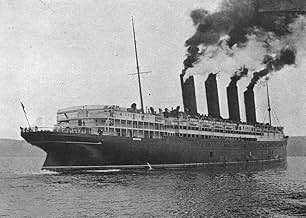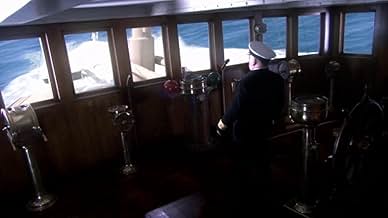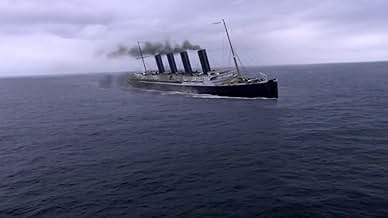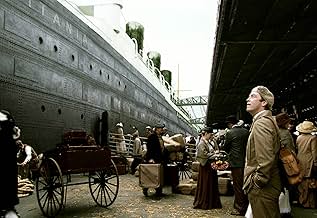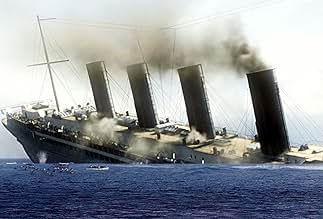Añade un argumento en tu idiomaA dramatization of the notorious World War I torpedoing of the ocean liner, RMS Lusitania.A dramatization of the notorious World War I torpedoing of the ocean liner, RMS Lusitania.A dramatization of the notorious World War I torpedoing of the ocean liner, RMS Lusitania.
- Dirección
- Guión
- Reparto principal
Florian Panzner
- Lt. Capt. Schwieger
- (as Florian Panzer)
Madeleine Garrood
- Avis Dolphin
- (as Maddeleine Garrood)
Andre Weideman
- Johnston
- (as Andre Weiderman)
Stephen Jennings
- Carson
- (as Steven Jennings)
Robyn LeAnn Scott
- Peggy
- (as Robyn Scott)
Reseñas destacadas
The Lusitania was a passenger ship of the Cunard Line, sunk by a German submarine in 1914 with a tremendous loss of life, 1200 crew and civilians of all ages, in the frigid waters of the north Atlantic. It was a big ship -- 800 feet long, about the size of a battleship -- and at 25 knots very fast for its time.
The German government had issued warnings that all British ships were in danger of being fired on because so many were transporting supplies and arms from the US to Britain. The US hadn't yet entered the war and the arms business was booming. But almost everyone, the Royal Navy included, scoffed at the warnings as hogwash.
When the ship is at sea, a scene took place that at first startled me. I was afraid the story would be completely derailed. We're all on the bridge, the captain (Kenneth Cranham) and number one are strutting around in their gold-emblazoned blue uniforms, and the humble helmsman pipes up with, "What course shall we be sailing when we enter submarine waters, captain?" I can't count the number of hours I spent at the helm of a US Coast Guard cutter, but if I or any other helmsman had been so impolitic as to ask a question like that, we'd have been drawn and quartered like William Wallace. Fortunately, the captain at once establishes a return to reality. "And what business is that of yours?", he snaps, shutting the cheeky helmsman up.
The story is carried by the narration of a Scots professor (John Hannah),one of the few survivors. The German U-boat crew is dealt with at some length, and portrayed more as ordinary humans rather than ravening beasts. In the more simple-minded films you can often tell at a glance what view of the enemy will be taken. How mean are they to one another and, especially, how ugly are they? An exception must be made for the brains behind the beef. The leader is often charming, suave, cultivated and fond of good wine and classical music.
The film is far harder on Alfred Vanderbilt (Kevin Otto), a handsome young scion of an American family that built its fortune in the fur trade. He's arrogant and sly. Sounds like a character in the unfortunate "Titanic," as it should. The stories and characters are isomorphic, except that instead of two doomed lovers we have the Scots professor and a young girl and neither of them drowns.
There's also a kind of epilogue. The German U-boat commander, who hesitates briefly before sinking the ship with a single torpedo, is not hailed as a hero back home because it's a propaganda victory for the Allies. He's lucky to keep his rank. The British seize on the event and promote it as evidence of the Hun's barbarity, claiming there were as many as three torpedoes, and using the incident to round up more enlistees. It also influenced America's entry into the war. The US hated all things German after the Lusitania. Sauerkraut became "liberty cabbage" (cf., "freedom fries"), and prohibition was enacted in 1919, which shut down all the breweries like Anheuser-Busch, Blatz, Schlitz, Reingold,and Budweiser.
The acting and direction are competent, although the young girl isn't much of an actress yet. The CGIs are primitive but acceptable for a TV movie. It's really a kind of history lesson, and not a bad one for today's youth.
The German government had issued warnings that all British ships were in danger of being fired on because so many were transporting supplies and arms from the US to Britain. The US hadn't yet entered the war and the arms business was booming. But almost everyone, the Royal Navy included, scoffed at the warnings as hogwash.
When the ship is at sea, a scene took place that at first startled me. I was afraid the story would be completely derailed. We're all on the bridge, the captain (Kenneth Cranham) and number one are strutting around in their gold-emblazoned blue uniforms, and the humble helmsman pipes up with, "What course shall we be sailing when we enter submarine waters, captain?" I can't count the number of hours I spent at the helm of a US Coast Guard cutter, but if I or any other helmsman had been so impolitic as to ask a question like that, we'd have been drawn and quartered like William Wallace. Fortunately, the captain at once establishes a return to reality. "And what business is that of yours?", he snaps, shutting the cheeky helmsman up.
The story is carried by the narration of a Scots professor (John Hannah),one of the few survivors. The German U-boat crew is dealt with at some length, and portrayed more as ordinary humans rather than ravening beasts. In the more simple-minded films you can often tell at a glance what view of the enemy will be taken. How mean are they to one another and, especially, how ugly are they? An exception must be made for the brains behind the beef. The leader is often charming, suave, cultivated and fond of good wine and classical music.
The film is far harder on Alfred Vanderbilt (Kevin Otto), a handsome young scion of an American family that built its fortune in the fur trade. He's arrogant and sly. Sounds like a character in the unfortunate "Titanic," as it should. The stories and characters are isomorphic, except that instead of two doomed lovers we have the Scots professor and a young girl and neither of them drowns.
There's also a kind of epilogue. The German U-boat commander, who hesitates briefly before sinking the ship with a single torpedo, is not hailed as a hero back home because it's a propaganda victory for the Allies. He's lucky to keep his rank. The British seize on the event and promote it as evidence of the Hun's barbarity, claiming there were as many as three torpedoes, and using the incident to round up more enlistees. It also influenced America's entry into the war. The US hated all things German after the Lusitania. Sauerkraut became "liberty cabbage" (cf., "freedom fries"), and prohibition was enacted in 1919, which shut down all the breweries like Anheuser-Busch, Blatz, Schlitz, Reingold,and Budweiser.
The acting and direction are competent, although the young girl isn't much of an actress yet. The CGIs are primitive but acceptable for a TV movie. It's really a kind of history lesson, and not a bad one for today's youth.
Movies about the Titanic have come and gone and many such movies, from blockbuster epics to cheap low budget movies (some were so low budgeted that the camera crews tilted their cameras instead of tilting the set!) have made their way from the movie theater and the TV, to video and later to DVD.
Yet little has been said about the Lusitania, whose sinking opened a lot of potential.
The story behind the Titanic can be summed up as follows:
Ship sets sail on its maiden voyage.
Ship hits an iceberg.
Ship sinks in the mid Atlantic.
Casualties mount.
A few survive.
End of the story.
But the Lusitania had a story far more complex. Were they bringing arms to England? Were passengers warned? Were dispatches sent to the Captain? Was the Captain innocent? Or was he guilty? These are complex questions with no real simple answers.
The movie was very well done and sure, some facts were distorted. It was war. And every historian knows that the first casualty in a war is the Truth.
Unlike TITANIC (1998), the central characters in this feature were not fictitious. They really did exist. Prof. Ian Holbourn (born November 5, 1872 and died September 15, 1935) was a passenger on the Lusitania. And he really befriended a young girl named Avis Dolphin (born 1903? and died February 5,1996).
And that "good German" on the U-boat that sank the Lusitania was not a fictitious character added to keep things politically correct, either. He also existed. Quartermaster Charles Vogele allegedly refused to relay the order to fire the torpedo and he was tried and courts-marshaled, and spend 3 years in prison for his crime. (Some accounts claimed that Voegele was an electrician, not a Quartermaster.)
It was no secret that Captain Turner later admitted that had the roles been reversed, he wouldn't had behaved any differently than Lt. Capt. Schwieger, who gave the order to fire that torpedo.
I rate this movie an 9 out of 10.
Yet little has been said about the Lusitania, whose sinking opened a lot of potential.
The story behind the Titanic can be summed up as follows:
Ship sets sail on its maiden voyage.
Ship hits an iceberg.
Ship sinks in the mid Atlantic.
Casualties mount.
A few survive.
End of the story.
But the Lusitania had a story far more complex. Were they bringing arms to England? Were passengers warned? Were dispatches sent to the Captain? Was the Captain innocent? Or was he guilty? These are complex questions with no real simple answers.
The movie was very well done and sure, some facts were distorted. It was war. And every historian knows that the first casualty in a war is the Truth.
Unlike TITANIC (1998), the central characters in this feature were not fictitious. They really did exist. Prof. Ian Holbourn (born November 5, 1872 and died September 15, 1935) was a passenger on the Lusitania. And he really befriended a young girl named Avis Dolphin (born 1903? and died February 5,1996).
And that "good German" on the U-boat that sank the Lusitania was not a fictitious character added to keep things politically correct, either. He also existed. Quartermaster Charles Vogele allegedly refused to relay the order to fire the torpedo and he was tried and courts-marshaled, and spend 3 years in prison for his crime. (Some accounts claimed that Voegele was an electrician, not a Quartermaster.)
It was no secret that Captain Turner later admitted that had the roles been reversed, he wouldn't had behaved any differently than Lt. Capt. Schwieger, who gave the order to fire that torpedo.
I rate this movie an 9 out of 10.
Over a century ago, there was a time when warfare between nations was expected to be fought with some semblance of chivalry, and noncombatants were to be protected from harm.
Any semblance of that finally came to an end on 7 May, 1915.
Based on true events, this docudrama tells the story of one of the most pivotal events of the First World War, the sinking of the RMS Lusitania. This was the other British liner that went down tragically, but whose death could not have been more different. While not as lavish a production as the James Cameron movie, "Lusitania" nevertheless gives the viewer a reasonably accurate picture of the ship and its end. The performances are good, the story pretty much follows the historic record, and the special effects are convincing enough in depicting the death of the doomed liner. One of the movie's best scenes intersperses actual film footage of the Lusitania leaving New York on her final voyage, a sobering and haunting moment.
There's also an important backstory, namely the reason why the Lusitania was attacked in the first place. Both Lusitania and her sister Mauretania were listed as auxiliary cruisers in the Royal Navy registry. The ship was also loaded with munitions, in violation of international law. Through their agents in New York, the Germans were aware of this. There was also the fact that Winston Churchill, head of the Admiralty, wanted to create an incident at sea to bring America into the allied cause.
There are of course, some flaws in this production. For instance, the actor portraying Captain Turner in no way resembles the real person. The late Ian Holm would have been a better choice. However ,the main criticism of this motion picture is sometimes it gives the impression of being "Titanic" meets "Das Boot".
But when the torpedo strikes the hull and the contraband munitions explode, all similarities come to an end, and the mayhem that was the sinking is shown. People are drowned, pulled under, and meet other horrific ends. Unlike the Titanic, the band did not play on, the lovers did not unite, there was no nobility displayed by the passengers, and the Captain did not go down with the ship. This is where this film truly becomes the "Anti-Titanic". But even this cannot fully bring forth the nightmare that was the Lusitania. To make a comparison, the Titanic took two and a half hours to go under, while the Lusitania, a ship 90 percent the Titanic's size, went down in just 18 minutes. The percentage of loss of life was significantly higher, with 1200 souls lost out of 2000 aboard, including 120 Americans.
The international condemnation of Germany that followed this horrific loss of life was near unanimous. Like a prairie fire a wave of shock and indignation spread throughout America, and none other than former President Theodore Roosevelt declared the Lusitania's sinking to be a "barbarous act of piracy". President Woodrow Wilson however, decided to err on the side of caution. Nevertheless, the fuse was lit for America's eventual entry into World War I.
Any semblance of that finally came to an end on 7 May, 1915.
Based on true events, this docudrama tells the story of one of the most pivotal events of the First World War, the sinking of the RMS Lusitania. This was the other British liner that went down tragically, but whose death could not have been more different. While not as lavish a production as the James Cameron movie, "Lusitania" nevertheless gives the viewer a reasonably accurate picture of the ship and its end. The performances are good, the story pretty much follows the historic record, and the special effects are convincing enough in depicting the death of the doomed liner. One of the movie's best scenes intersperses actual film footage of the Lusitania leaving New York on her final voyage, a sobering and haunting moment.
There's also an important backstory, namely the reason why the Lusitania was attacked in the first place. Both Lusitania and her sister Mauretania were listed as auxiliary cruisers in the Royal Navy registry. The ship was also loaded with munitions, in violation of international law. Through their agents in New York, the Germans were aware of this. There was also the fact that Winston Churchill, head of the Admiralty, wanted to create an incident at sea to bring America into the allied cause.
There are of course, some flaws in this production. For instance, the actor portraying Captain Turner in no way resembles the real person. The late Ian Holm would have been a better choice. However ,the main criticism of this motion picture is sometimes it gives the impression of being "Titanic" meets "Das Boot".
But when the torpedo strikes the hull and the contraband munitions explode, all similarities come to an end, and the mayhem that was the sinking is shown. People are drowned, pulled under, and meet other horrific ends. Unlike the Titanic, the band did not play on, the lovers did not unite, there was no nobility displayed by the passengers, and the Captain did not go down with the ship. This is where this film truly becomes the "Anti-Titanic". But even this cannot fully bring forth the nightmare that was the Lusitania. To make a comparison, the Titanic took two and a half hours to go under, while the Lusitania, a ship 90 percent the Titanic's size, went down in just 18 minutes. The percentage of loss of life was significantly higher, with 1200 souls lost out of 2000 aboard, including 120 Americans.
The international condemnation of Germany that followed this horrific loss of life was near unanimous. Like a prairie fire a wave of shock and indignation spread throughout America, and none other than former President Theodore Roosevelt declared the Lusitania's sinking to be a "barbarous act of piracy". President Woodrow Wilson however, decided to err on the side of caution. Nevertheless, the fuse was lit for America's eventual entry into World War I.
Superb adaptation of the acclaimed book by Diane Preston. This film keeps close to the facts as it dramatizes the horrific sinking of the passenger liner Lusitana by a German submarine in the Great War. The tragedy of the sinking is all too realistically recreated and one can not be chilled to the bone how senseless this act truly was. John Hannah is superb as one of the passengers who befriends a young victim to be. This should be seen by all people everywhere so the Lusitania is never forgotten, so such an act is never repeated, and so those who died did not do so in vain. This will stand as an important document regarding the crimes of piracy committed by the German Empire 1914-1918.
If you want the best info on it read the book Dead Wake. excellent in the details. makes you think you where on it with the detail info on passengers. used the war diary from the german sub commander and he reviewed the books and pics from the sinking. he obtained some very recent info from the British secret service who knew where the sub was but didint tell the ship. a sad bunch of unfortunate circumstances.
¿Sabías que...?
- CuriosidadesThe U-20 set was the original U-96 set used in El submarino (Das Boot) (1981). The Type U-19 of World War I and Type VIIC of World War II had similar internal dimensions.
- PifiasOn at least two occasions the captain of the U 20 gives the order to "blow ballast" when he wants to dive the submarine. This order would result in all water being blown out of the ballast tanks and should only be given to surface the boat. In order to dive a submarine one must flood the ballast tanks with water.
- Citas
Captain Turner: They're not interested in the truth.
- Créditos adicionalesAdrian Topol's character name is pronounced Voegele in the German dialogue and is spelled this way in the accompanying English subtitles. However in the credits it is spelled Vogele. Correct German spelling uses either "ö" (o with an umlaut) or else "oe".
- ConexionesFeatured in Titanic al detalle (2013)
Selecciones populares
Inicia sesión para calificar y añadir a tu lista para recibir recomendaciones personalizadas
Detalles
- Fecha de lanzamiento
- Países de origen
- Idiomas
- Títulos en diferentes países
- Sinking of the Lusitania: Terror at Sea
- Empresas productoras
- Ver más compañías en los créditos en IMDbPro
Contribuir a esta página
Sugerir un cambio o añadir el contenido que falta

